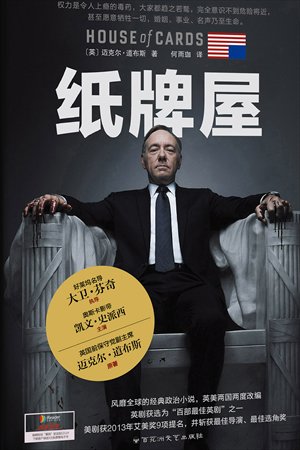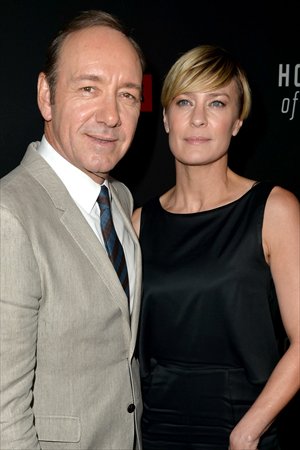The darker, the better
By Liao Danlin Source:Global Times Published: 2014-2-25 21:08:01

The cover for the Chinese translation of House of Cards Photo: Courtesy of Baihuazhou Literature and Art Publishing House

The stars of House of Cards arrive at Netflix screening Photo: CFP
"Have you seen the new season of House of Cards?" This has become a popular question recently even among those who have only watched an episode or two of the popular American drama, let alone fans of the show.The drama's popularity doesn't just stop there, the Chinese version of the book the show is based on hit bookstores in China on Friday. For those people who enjoy reading over watching this gives them a chance to enjoy a story that has set the entertainment industry on fire.
Continuing popularity
After its first season was released, House of Cards was seen by many as introducing a brand new level of quality to original Internet content production. It seems that Netflix, the Internet streaming site behind the show, has managed to find the perfect formula by combining David Fincher, Kevin Spacey and the 1991 BBC version of House of Cards together.
After the 13-episode season one became available online, this successful series quickly turned Netflix from an Internet streaming service and DVD delivery company into a leading original content producer, while also bringing in millions of users to the service.
This wave of popularity soon spread to China when Sohu TV, a Chinese online video website famous for having the most up-to-date American series, introduced the entire first season to home audiences last year.
Famous online film critics Yun Zhong and KTV (pseudonym) even dedicated an entire special episode of the Web-lecture series they produce on video site Youku, Film Public High Class, to examining and interpreting the film language in the House of Cards series. This was the first TV drama discussed on the program, which previously covered Western directors such as Quentin Tarantino and Steven Spielberg.
The second season has drawn just as much attention as the first one, with the first episode of this season receiving around 8.5 million views so far on Sohu TV.
"Obama and Wang Qishan both love to watch House of Cards" has also appeared as a headline on the life and entertainment page of many a Chinese newspaper. Meanwhile, when the second season's story line began to involve China this sparked all sorts of discussion online.
Chinese audiences have always favored political drama, although most Chinese dramas tend to portray politics against the historical background of different dynasties.
News critic Li Mingbo from Guangzhou Daily commented on Chinese audiences' appetite for this particular type of show saying that if you could understand why historical drama The Legend of Zhenhuan was popular in China, you would know why House of Cards could make such headway across the nation.
"One takes place in the White House, while the other in a traditional Chinese palace, but both tell stories about deadly political battles and game theory. That's human nature," said Li.
From England to America to China
Not only has the character of Francis Urquhart (Francis Underwood in the American drama), or FU as House of Cards author Michael Dobbs calls him, achieved new life because of this series, so too has the book series itself.
A new version of the first House of Cards novel was republished this year and while the story has not changed much every chapter now has a new "intro" with the characters and some of the dialogue being slightly altered from the original 1989 version.
Dobbs wrote an article for the Huffington Post titled "Book Versus Show: House of Cards" claiming that when he first started writing the story after "a furious row with Prime Minister Margaret Thatcher" he never expected it would transform his life so completely.
Published by Baihuazhou Literature and Art Publishing House, a publisher that specializes in publishing film and TV related books, in cooperation with Ruyi Media, the Chinese version was the result of a year's hard work involving obtaining publishing rights, translating the work and bringing the final product to bookstores.
Editor Pan Jiangxiang wrote in his editor's note that it wasn't up to him for the book to achieve the same reputation and sales numbers that the television series has achieved. "Everything comes down to the market," he said.
Cheng Yue, director of the editorial office at Baihuazhou Literature and Art Publishing House, sees the introduction of the Chinese version as a chance to capture the focus of the Chinese public. "All efforts were made to capture the charm of what is seen on screen. The book is an outstanding genre novel and is both dark and sophisticated," Cheng told the Global Times.
Contrast
"I don't know how you define politics, but looking at House of Cards it is both bloody and incredibly interesting," wrote book critic An Yi in her review. An feels the most brilliant part of the book is that the author himself knows firsthand the temptation that political situations bring.
"He describes circumstances so well that even if you haven't seen the TV series, you can imagine how pale Francis's face looks at a particular moment," An pointed out.
The 27-year-old translator of the book, He Yujia, told the Global Times that she had two strong impressions after reading this book written 25 years ago.
One impression had to do with the time period. Since the original book is about British politics during the 1980s and 1990s it lacks the colorful plots dealing with social media and the use of cell phones that appear in the show.
The other dealt with the realism portrayed in the book. As a politician who experienced real battles in the British parliament, He feels the author was able to make everything in the book very real and powerful.
"It is more direct and brutal than the show," said He, adding that she could see how the writer himself was reflected in the character FU.
She feels that at its core, the book is about the battles that occur during power struggles and the resulting fallout. In the end FU wins his fight, but his victory is filled with loneliness and emptiness.
Though the adaptation is different because of changes made to the story's background, He finds the darker second series is closer to the spirit of the original book.
Dobbs himself has made a comparison between show and book, "The US series is different, of course, but not that different than the book that started it all… It's a dark tale of greed, corruption and unquenchable ambition."
Posted in: Books